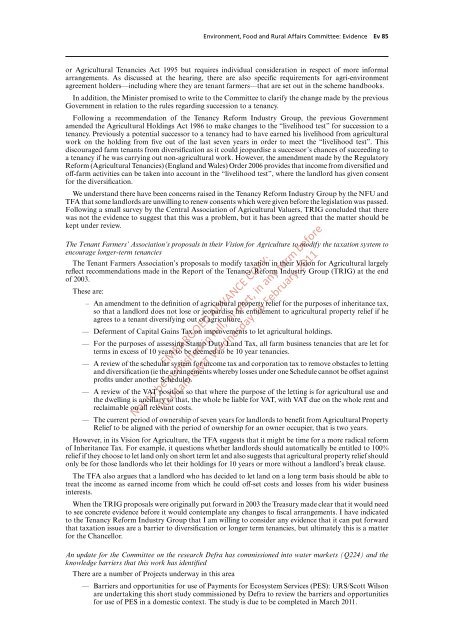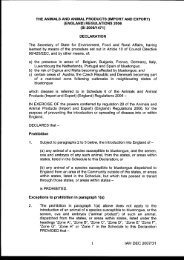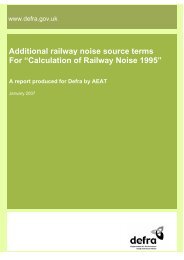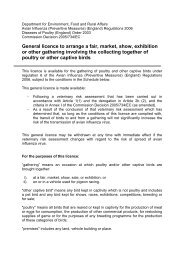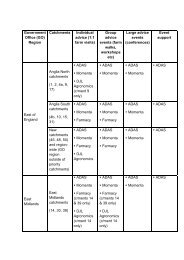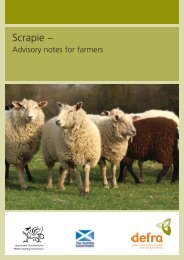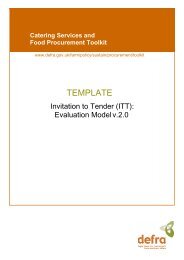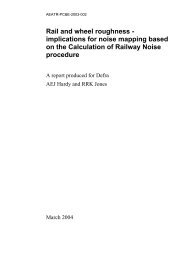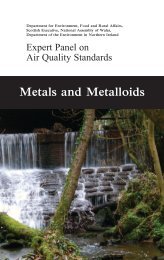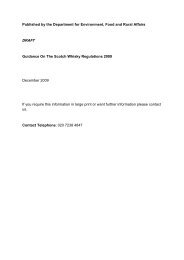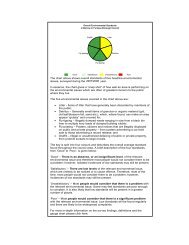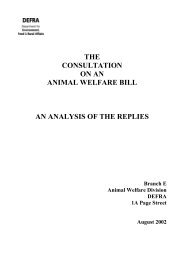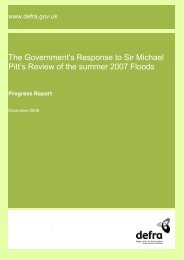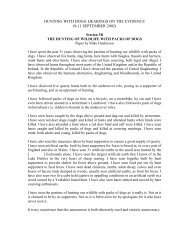Farming in the Uplands - ARCHIVE: Defra
Farming in the Uplands - ARCHIVE: Defra
Farming in the Uplands - ARCHIVE: Defra
Create successful ePaper yourself
Turn your PDF publications into a flip-book with our unique Google optimized e-Paper software.
Environment, Food and Rural Affairs Committee: Evidence Ev 85<br />
or Agricultural Tenancies Act 1995 but requires <strong>in</strong>dividual consideration <strong>in</strong> respect of more <strong>in</strong>formal<br />
arrangements. As discussed at <strong>the</strong> hear<strong>in</strong>g, <strong>the</strong>re are also specific requirements for agri-environment<br />
agreement holders—<strong>in</strong>clud<strong>in</strong>g where <strong>the</strong>y are tenant farmers—that are set out <strong>in</strong> <strong>the</strong> scheme handbooks.<br />
In addition, <strong>the</strong> M<strong>in</strong>ister promised to write to <strong>the</strong> Committee to clarify <strong>the</strong> change made by <strong>the</strong> previous<br />
Government <strong>in</strong> relation to <strong>the</strong> rules regard<strong>in</strong>g succession to a tenancy.<br />
Follow<strong>in</strong>g a recommendation of <strong>the</strong> Tenancy Reform Industry Group, <strong>the</strong> previous Government<br />
amended <strong>the</strong> Agricultural Hold<strong>in</strong>gs Act 1986 to make changes to <strong>the</strong> “livelihood test” for succession to a<br />
tenancy. Previously a potential successor to a tenancy had to have earned his livelihood from agricultural<br />
work on <strong>the</strong> hold<strong>in</strong>g from five out of <strong>the</strong> last seven years <strong>in</strong> order to meet <strong>the</strong> “livelihood test”. This<br />
discouraged farm tenants from diversification as it could jeopardise a successor’s chances of succeed<strong>in</strong>g to<br />
a tenancy if he was carry<strong>in</strong>g out non-agricultural work. However, <strong>the</strong> amendment made by <strong>the</strong> Regulatory<br />
Reform (Agricultural Tenancies) (England and Wales) Order 2006 provides that <strong>in</strong>come from diversified and<br />
oV-farm activities can be taken <strong>in</strong>to account <strong>in</strong> <strong>the</strong> “livelihood test”, where <strong>the</strong> landlord has given consent<br />
for <strong>the</strong> diversification.<br />
We understand <strong>the</strong>re have been concerns raised <strong>in</strong> <strong>the</strong> Tenancy Reform Industry Group by <strong>the</strong> NFU and<br />
TFA that some landlords are unwill<strong>in</strong>g to renew consents which were given before <strong>the</strong> legislation was passed.<br />
Follow<strong>in</strong>g a small survey by <strong>the</strong> Central Association of Agricultural Valuers, TRIG concluded that <strong>the</strong>re<br />
was not <strong>the</strong> evidence to suggest that this was a problem, but it has been agreed that <strong>the</strong> matter should be<br />
kept under review.<br />
The Tenant Farmers’ Association’s proposals <strong>in</strong> <strong>the</strong>ir Vision for Agriculture to modify <strong>the</strong> taxation system to<br />
encourage longer-term tenancies<br />
The Tenant Farmers Association’s proposals to modify taxation <strong>in</strong> <strong>the</strong>ir Vision for Agricultural largely<br />
reflect recommendations made <strong>in</strong> <strong>the</strong> Report of <strong>the</strong> Tenancy Reform Industry Group (TRIG) at <strong>the</strong> end<br />
of 2003.<br />
These are:<br />
– An amendment to <strong>the</strong> def<strong>in</strong>ition of agricultural property relief for <strong>the</strong> purposes of <strong>in</strong>heritance tax,<br />
so that a landlord does not lose or jeopardise his entitlement to agricultural property relief if he<br />
agrees to a tenant diversify<strong>in</strong>g out of agriculture.<br />
— Deferment of Capital Ga<strong>in</strong>s Tax on improvements to let agricultural hold<strong>in</strong>gs.<br />
— For <strong>the</strong> purposes of assess<strong>in</strong>g Stamp Duty Land Tax, all farm bus<strong>in</strong>ess tenancies that are let for<br />
terms <strong>in</strong> excess of 10 years to be deemed to be 10 year tenancies.<br />
— A review of <strong>the</strong> schedular system for <strong>in</strong>come tax and corporation tax to remove obstacles to lett<strong>in</strong>g<br />
and diversification (ie <strong>the</strong> arrangements whereby losses under one Schedule cannot be oVset aga<strong>in</strong>st<br />
profits under ano<strong>the</strong>r Schedule).<br />
— A review of <strong>the</strong> VAT position so that where <strong>the</strong> purpose of <strong>the</strong> lett<strong>in</strong>g is for agricultural use and<br />
<strong>the</strong> dwell<strong>in</strong>g is ancillary to that, <strong>the</strong> whole be liable for VAT, with VAT due on <strong>the</strong> whole rent and<br />
reclaimable on all relevant costs.<br />
— The current period of ownership of seven years for landlords to benefit from Agricultural Property<br />
Relief to be aligned with <strong>the</strong> period of ownership for an owner occupier, that is two years.<br />
However, <strong>in</strong> its Vision for Agriculture, <strong>the</strong> TFA suggests that it might be time for a more radical reform<br />
of Inheritance Tax. For example, it questions whe<strong>the</strong>r landlords should automatically be entitled to 100%<br />
relief if <strong>the</strong>y choose to let land only on short term let and also suggests that agricultural property relief should<br />
only be for those landlords who let <strong>the</strong>ir hold<strong>in</strong>gs for 10 years or more without a landlord’s break clause.<br />
The TFA also argues that a landlord who has decided to let land on a long term basis should be able to<br />
treat <strong>the</strong> <strong>in</strong>come as earned <strong>in</strong>come from which he could oV-set costs and losses from his wider bus<strong>in</strong>ess<br />
<strong>in</strong>terests.<br />
When <strong>the</strong> TRIG proposals were orig<strong>in</strong>ally put forward <strong>in</strong> 2003 <strong>the</strong> Treasury made clear that it would need<br />
to see concrete evidence before it would contemplate any changes to fiscal arrangements. I have <strong>in</strong>dicated<br />
to <strong>the</strong> Tenancy Reform Industry Group that I am will<strong>in</strong>g to consider any evidence that it can put forward<br />
that taxation issues are a barrier to diversification or longer term tenancies, but ultimately this is a matter<br />
for <strong>the</strong> Chancellor.<br />
EMBARGOED ADVANCE COPY:<br />
Not to be published <strong>in</strong> full, or part, <strong>in</strong> any form before<br />
00.01am GMT Wednesday 16 February 2011<br />
An update for <strong>the</strong> Committee on <strong>the</strong> research <strong>Defra</strong> has commissioned <strong>in</strong>to water markets (Q224) and <strong>the</strong><br />
knowledge barriers that this work has identified<br />
There are a number of Projects underway <strong>in</strong> this area<br />
— Barriers and opportunities for use of Payments for Ecosystem Services (PES): URS/Scott Wilson<br />
are undertak<strong>in</strong>g this short study commissioned by <strong>Defra</strong> to review <strong>the</strong> barriers and opportunities<br />
for use of PES <strong>in</strong> a domestic context. The study is due to be completed <strong>in</strong> March 2011.


